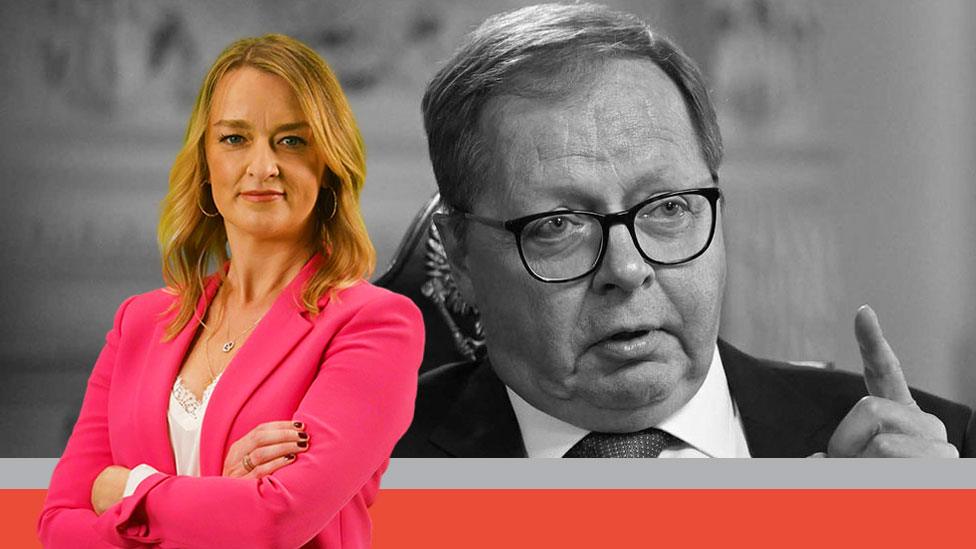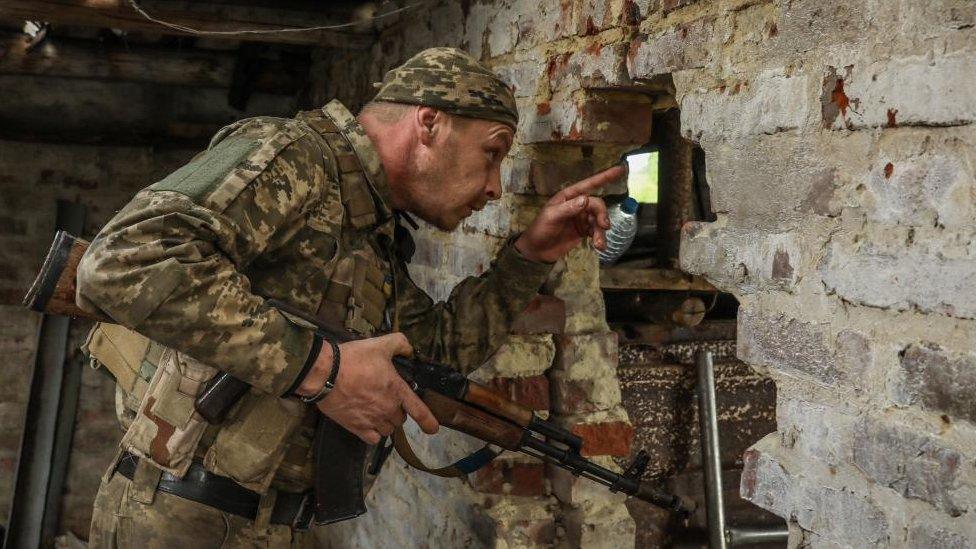Ukraine war: Russian Ambassador Andrei Kelin issues warning of escalation in Ukraine
- Published

Russia has warned Western supplies of weapons to Ukraine risk escalating the war to levels not seen so far.
Andrei Kelin, Russia's ambassador to the UK, told the BBC his country had "enormous resources" and it was yet to "act very seriously".
His remarks come despite more than a year of fighting and widespread evidence of Russian war crimes.
In the interview with Laura Kuenssberg, he suggested he was offended when challenged about Russia's conduct.
Speaking exclusively to the BBC, Mr Kelin warned of a "new dimension" in the war.
Insisting Russia "hasn't just started yet to act very seriously", the ambassador said "Russia is 16 times bigger than Ukraine. We have enormous resources."
The length of the conflict, he said, "depends on the efforts in escalation of war that is being undertaken by Nato countries, especially by the UK".
He added: "Sooner or later, of course, this escalation may get a new dimension which we do not need and we do not want. We can make peace tomorrow."
The ambassador's comments came as one of Ukraine's most senior security officials, Oleksiy Danilov, told the BBC the country is ready to launch its long expected counter-offensive against Russian forces.
But Mr Kelin's claim that Russia has "enormous resources" available to fight clashes with multiple reports on the ground of its forces being poorly equipped and without proper training.

On this week's show are Health Secretary Steve Barclay, shadow work and pensions secretary Jonathan Ashworth
Watch live on BBC One and iPlayer from 09:00 BST on Sunday
Follows latest updates in text and video on the BBC News website from 08:00

Those warnings have even come from the head of Russia's Wagner mercenary group, Yevgeny Prigozhin, who has been heavily involved in the conflict.
He has been one of Vladimir Putin's staunchest supporters, but has been increasingly vocal and critical of the regime, suggesting in the last few days "we could lose Russia" if the war carried on without extra resources being provided.
Earlier this month he publicly scolded Putin's ministers in a post on social media, surrounded by dead bodies of his fighters. "Where is the... ammunition?", he said. "They came here as volunteers and die for you to fatten yourselves in your mahogany offices."
The denial of the situation on the ground by Mr Kelin was accompanied by his repetition of baseless claims about Russia's invasion, which he still insisted on calling a "special military operation".
Mr Kelin was speaking in his residence, underneath a chandelier, where the chairs are gilt and coffee served by staff with white gloves.
He tried to blame Ukraine for provoking the conflict. It's a familiar and untrue claim that has been used by Russian leaders for more than a year to try to justify its illegal invasion of Ukraine in the first place.
Laura Kuenssberg challenges Andrei Kelin over war crimes in Ukraine
Like his ambassador, President Putin continues to claim a neo-Nazi regime was set up in Ukraine in 2014 and that it was even seeking to acquire nuclear weapons, which meant Russia had no choice but to invade.
And the ambassador denies reality when it comes to the behaviour of Russian troops on the ground during the conflict, too.
Confronted with evidence from an official United Nations report of widespread crimes, torture, rape and the forced deportation of children, he replied by claiming Ukrainian forces had committed crimes against civilians too.
There is evidence of a small number of human rights violations by Ukrainian forces. But the scale of Russian abuses is widespread, well-documented and beyond doubt.
When pressed that Russia was simply lying about what has happened, and the clear patterns of appalling abuse, the ambassador claimed in our interview to be offended.
And he had no other response to the latest missile attack in Dnipro other than to say "the problem is that the shooting is going on for nine years, and every day shooting is going on Luhansk, Donetsk and all of that", claiming that the western media was ignoring acts being carried out by Ukrainian forces.
The ambassador's comments that the war is not yet "serious" contradicts the experience of so many Ukrainians whose lives have been turned upside down by the war, and many Russians who are suffering.
But as Ukraine plans its counter-offensive, and Russia shows no sign of retreat, the war may indeed get more serious still.
You can watch our interview with Ambassador Kelin on the show tomorrow morning at 09:00, where we talk about what is going on in the conflict and also about how President Putin deals with criticism, how he can justify war crimes, and when the conflict could end.
And, after a big week or the NHS, when both Labour and the Conservatives set out their plans, we'll be joined by the Health Secretary, Steve Barclay.

More from Laura Kuenssberg
Follow Laura on Twitter, external
Related topics
- Published27 May 2023
